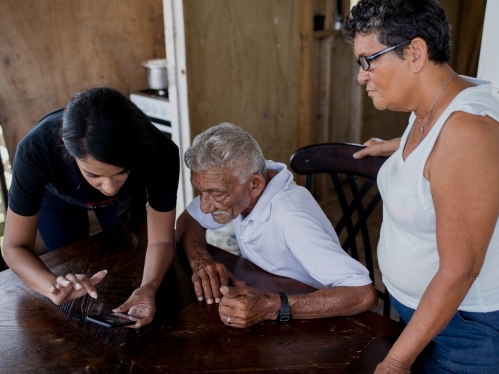Margaret Chiappetta
Margaret is a student in the Online MSW Program with a clinical focus. This year, Margaret will be completing their practicum at the Memorial Sloan Kettering Cancer Center

As part of its continued commitment to fostering excellence in social work and aging, the Rutgers School of Social Work offers MSW students the opportunity to become engaged in a fellowship opportunity focusing on working with aging populations. MSW students who are selected as Taub Fellows in Aging demonstrate exceptional commitment to work with older adults and their families. They also demonstrate a high level of potential for enacting leadership in gerontology at micro and macro levels of social work practice.


Margaret is a student in the Online MSW Program with a clinical focus. This year, Margaret will be completing their practicum at the Memorial Sloan Kettering Cancer Center
Diana is a student in the On-Campus MSW Program with a clinical focus. This year, Diana will be completing their practicum at Penn Medicine Princeton House Behavioral Health
Kylie is a student in the On-Campus MSW Program with a clinical focus. This year, Kylie will be completing their practicum at Parker Health Group
Christopher is a student in the Online MSW Program with a clinical focus. This year, Christopher will be completing their practicum at Jewish Family and Children's Service of Greater Mercer County
Find answers to all your questions. Still have more? Contact us at aging@ssw.rutgers.edu.
The Fellowship is a competitive program open to MSW students in the Aging and health Certificate Program. Unlike the Certificate Program, the Taub Fellowship in Aging offers compensation in exchange for the students’ completion of a leadership project. Leadership projects are focused on an area of need at the students’ practicum learning placement.
All Taub Fellows are required to complete a leadership project that is based on their practicum learning placement. The requirements for the leadership project are purposely flexible so that the project can be responsive to the needs of the organization, as well as to the students’ interests. In general, a successful leadership project demonstrates the following characteristics:
The program is structured so that students can complete the requirements of the fellowship largely within their regularly allotted course and practicum requirements. For example, the leadership project is to be completed within students’ regular practicum learning hours.
Fellows are occasionally asked to complete a minimal amount of additional work, such as writing up descriptions of their leadership projects and attending group meetings about three times throughout each semester, 6 meetings a year. With approval from their practicum learning instructors, fellows can use their practicum learning hours to complete these responsibilities.
As the Fellowship is a practicum-based program, only Aging and Health Certificate students who will be entering their advanced year of practicum learning (i.e., Practicum Learning III) for the following academic year are eligible to apply.
The Fellowship is an opportune experience for students in both concentrations. Leaders for the field of aging need skills in both clinical social work as well as management and policy – related work. Fellows from both concentrations have successfully completed the program in the past.
Certainly. The Coordinator of the Aging and Health Certificate Program, Dr. Lauren Snedeker, works with all students in the Aging and Health Certificate program to identify a practicum learning placement. As long as students are entering their advanced year of the MSW program and have been accepted into the Aging and Health Certificate Program, they can apply to the Fellowship.
As long as the student has been accepted into the Aging and Health Certificate Program and their practicum learning is in a setting that focuses on social work with older adults, students can apply to the Fellowship.
The application review process begins in May. Applicants must submit an online application to the Coordinator of the Aging and Health Certificate, Dr. Lauren Snedeker. This information is then used to select applicants. Applicants will be notified via email by June of their application status.